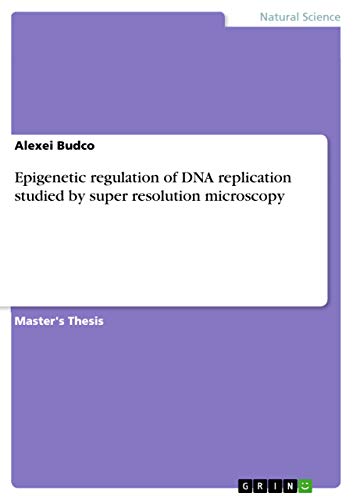Items related to Epigenetic regulation of DNA replication studied by...

"synopsis" may belong to another edition of this title.
- PublisherGRIN Verlag
- Publication date2015
- ISBN 10 3668010609
- ISBN 13 9783668010604
- BindingPaperback
- Number of pages104
Buy New
Learn more about this copy
Shipping:
£ 19.75
From Germany to U.S.A.
Top Search Results from the AbeBooks Marketplace
Epigenetic regulation of DNA replication studied by super resolution microscopy
Book Description Taschenbuch. Condition: Neu. This item is printed on demand - it takes 3-4 days longer - Neuware -Master's Thesis from the year 2014 in the subject Biology - Genetics / Gene Technology, grade: 1.0 (A+), LMU Munich (Department Biologie II), language: English, abstract: DNA replication is a fundamental biological process responsible for accurate duplication of genetic information necessary for its faithful inheritance to the two daughter cells. Despite much effort, the underlying mechanisms controlling this process are not fully understood. In order to accommodate very large and complex genomes, replication dynamics in eukaryotes evolved to become controlled by major epigenetic mechanisms. Moreover, the spatio-temporal organization of S-phase progression changes throughout cell differentiation and development. The study of genome duplication has been largely hindered by the lack of appropriate monitoring techniques, and any comprehensive understanding ultimately requires quantitative approach.In this master's thesis, we analyzed replication patterns in mouse somatic and embryonic stem cells (mESCs) with newly developed three-dimensional structured illumination microscopy (3D-SIM) to register the progression of S-phase in more detail than previously described. We successfully established an automated workflow to produce reliable and reproducible replication foci (RF) counts in C2C12 cells from 3DSIM data and TANGO (Tools for Analysis of Nuclear Genome Organization). Such an approach has not been described before, and could be used to evaluate further cell types and schemes.We observed significant differences in replication timing and progression between somatic (C2C12, C127) and mESCs (HI5). In this report we show that in mESCs S-phase lasts significantly longer (15 h), with a 'leaky' chromocenter replication profile compared to somatic cells. Furthermore, differentiated HI5 female mESCs into epiblast-like cells (EpiLCs) exhibit inactive X chromosome and differential replication timing of Xi within two dist 104 pp. Englisch. Seller Inventory # 9783668010604
Epigenetic regulation of DNA replication studied by super resolution microscopy
Book Description Taschenbuch. Condition: Neu. Druck auf Anfrage Neuware - Printed after ordering - Master's Thesis from the year 2014 in the subject Biology - Genetics / Gene Technology, grade: 1.0 (A+), LMU Munich (Department Biologie II), language: English, abstract: DNA replication is a fundamental biological process responsible for accurate duplication of genetic information necessary for its faithful inheritance to the two daughter cells. Despite much effort, the underlying mechanisms controlling this process are not fully understood. In order to accommodate very large and complex genomes, replication dynamics in eukaryotes evolved to become controlled by major epigenetic mechanisms. Moreover, the spatio-temporal organization of S-phase progression changes throughout cell differentiation and development. The study of genome duplication has been largely hindered by the lack of appropriate monitoring techniques, and any comprehensive understanding ultimately requires quantitative approach.In this master's thesis, we analyzed replication patterns in mouse somatic and embryonic stem cells (mESCs) with newly developed three-dimensional structured illumination microscopy (3D-SIM) to register the progression of S-phase in more detail than previously described. We successfully established an automated workflow to produce reliable and reproducible replication foci (RF) counts in C2C12 cells from 3DSIM data and TANGO (Tools for Analysis of Nuclear Genome Organization). Such an approach has not been described before, and could be used to evaluate further cell types and schemes.We observed significant differences in replication timing and progression between somatic (C2C12, C127) and mESCs (HI5). In this report we show that in mESCs S-phase lasts significantly longer (15 h), with a 'leaky' chromocenter replication profile compared to somatic cells. Furthermore, differentiated HI5 female mESCs into epiblast-like cells (EpiLCs) exhibit inactive X chromosome and differential replication timing of Xi within two dist. Seller Inventory # 9783668010604

